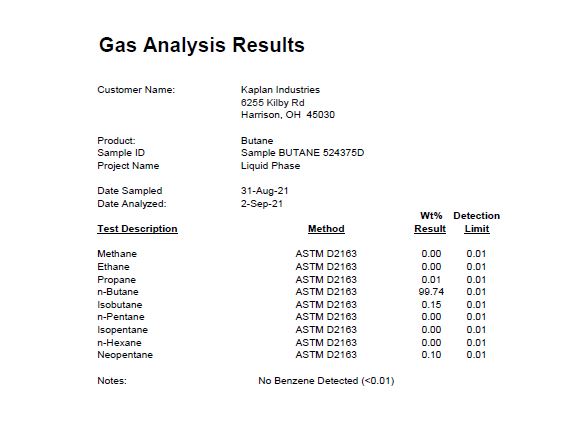This thread was started to discuss testing labs experiencing more failures for benzene content. Extractors are properly focused on their businesses. Now that there is a problem with excessive benzene, they are forced to focus on the quality of hydrocarbon solvents they purchase. We’ve considered cylinders, bulk tanks, burp-back from inexperienced extractors and scuzzy coffee cups. I suggest that the problem is in the gas itself. There is bad gas going into the marketplace and it’s not coming from us.
The industry standard specification for instrument grade n-butane is 99.5% purity. This allows 5,000 parts-per-million of non-N-butane in it. In order to get a higher purity n-butane, you need to process the whole batch to reduce the total contaminates to 5,000 ppm. Let’s call this level “PURIFIED”.
In order to get that gas to 99.9% (the impurities in the material are limited 1,000 ppm) - - you have to process the 99.5% to remove 4/5 of the 5,000 ppm contamination. Let’s call this level “RE-PURIFIED”.
To get to 99.99%, the impurities are limited to 100 ppm. You have to process the 99.9% to remove 90% of the contamination in the 1,000 ppm product. Let’s call this level “RE-RE-PURIFIED”
As if that’s not challenging enough, some n-butane has been claimed to analyze to 99.996% allowing total impurities of 40 ppm. They would have to continuing processing to 60% of the contamination in the 99.99% material. This would be called “RE-RE-RE-PURIFIED”. When I consider all the work that needs to be done to step through the above purification levels, OR to go directly from 5,000 ppm to 40 ppm contamination on a production level, I suggest we face the facts and call this purity level “BULLSHIT”.
A facility can run n-butane through molecular sieves, proprietary media, activated charcoal, semi-activated charcoal, non-activated charcoal, coffee filters, talcum powder, frankincense, Eggo waffles, this, that and whatever. It doesn’t matter - producing 99.996% pure n-butane in volume cannot be done.
*** I edited this post to make it more pleasant. ***


